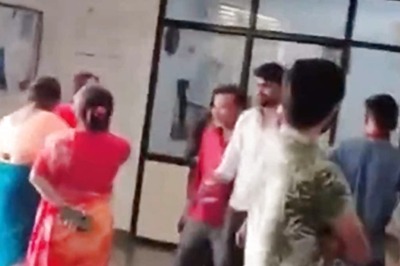
views
Under attack for accepting the Rajya Sabha membership, former CJI Ranjan Gogoi on Wednesday hit out at what he coined “activist judges” who start raising questions on judiciary immediately after their retirement but keep quiet while in office.
"Who are these activist judges working with? Who is giving platforms to them for saying all this? There are no questions asked," said Justice Gogoi.
He also emphasised that there is another category of judges, who get friendly with lawyers during their work, and one would notice commercial arbitration works flowing to a select few judges after their retirement.
"How and why do arbitration works flow to only some judges and not to others? Again, no questions asked," said the former Chief Justice of India.
Justice Gogoi made these statements at a webinar organised by the Confederation of Alumni for National Law Universities.
According to him, there were in fact three categories of post-retirement assignments of a judge, which included "activist judges", those taking up commercial arbitrations and the third, accepting other kinds of assignments.
"Why only it is the third category that draws all the flak? Why are no questions asked about the other two?" asked Justice Gogoi.
He referred to a report by Vidhi Centre for Legal Policy released in 2016 that underlined that 70 of 100 retired judges of the constitutional court got one or the other assignment.
"Were all of them compromised? Did it mean independence of judiciary was compromised? It is an individual perception. So long as you are clear in your mind, there is no problem. If a judge is true to his functions, post-retirement work is okay. It has to depend on individuals," asserted Justice Gogoi.
He also answered a question as to why Ayodhya verdict did not carry the name of its author.
"Why must a judgment of being Supreme Court have the name of its author? I can show 32 cases decided by a particular bench in 2015-16 when author wasn't named in the judgment. But then no questions were asked. Speaking for myself, I have myself been author of 13 judgments when author wasn't mentioned," pointed out Justice Gogoi.
About Ayodhya judgment, he asked why it was so difficult to accept that five judges on a bench decided a matter unanimously and nobody wanted to take the credit of being the author of a judgment.
"Why does a judgment need one author? That judgment (Ayodhya) was signed by five judges. All five judges are the authors," he added.
Justice Gogoi further said questions about name of the judge who wrote Ayodhya verdict are raised usually by 'critics' who wanted all five judges to author separate judgments so that the verdict couldn't come before his retirement in November 2019.
The former CJI also had a word of caution against indiscriminate and unreasonable criticism of the judges: "We still have people of great wisdom on the Bench. Let them flourish. Let them do their work. Don't dishearten them. Support them."




















Comments
0 comment